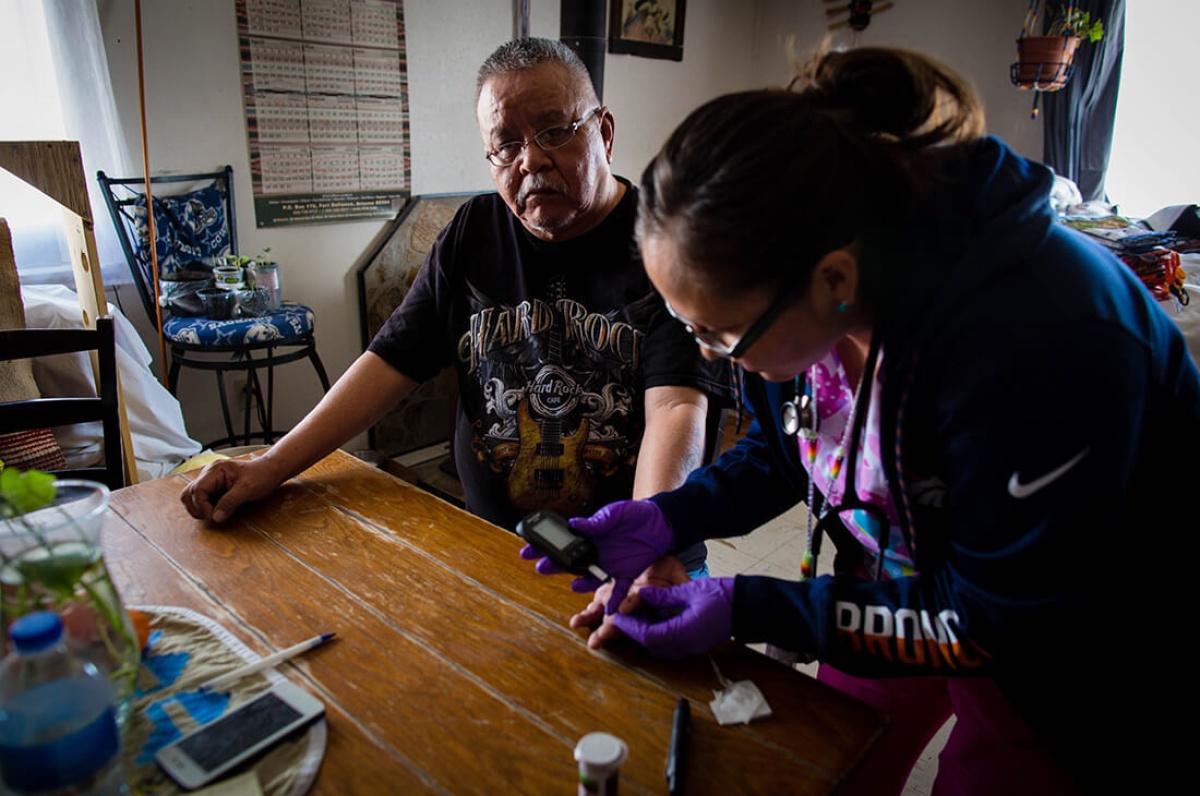R&I: Study Highlights Community Health Representatives’ Impact on Diabetes in Navajo Nation
Researchers find patients’ blood sugar, cholesterol levels drop with intervention
Posted on Nov 13, 2020

In the United States, Native Americans face disproportionate rates of type 2 diabetes, a chronic condition in which the body either doesn’t produce enough insulin or resists the effects of insulin. If untreated, the disease can lead to serious and even fatal complications including kidney failure, heart attack, or stroke.
Diabetes is especially prevalent in Navajo Nation, where about 25,000 people suffer from type 2 diabetes and 75,000 are estimated to have prediabetes. The high rate of diabetes among Native Americans stems from decades of systemic racism, which have led to unemployment, food deserts, lack of running water, and a weakened health system.
That’s why Partners In Health (PIH), Brigham and Women’s Hospital (BWH) and its sister organization in Navajo Nation, Community Outreach and Patient Empowerment (COPE), have worked to strengthen Navajo Nation’s Community Health Representative Program, which hires and trains local residents to provide compassionate, culturally appropriate care to patients in their communities.
Recent research highlights the importance of this work. A study, published last November in the International Journal for Equity in Health, found that patients who received home visits and other care from Community Health Representatives showed an improvement in blood sugar levels and cholesterol levels over those who did not, lowering their risks for diabetes complications, such as heart attacks and blindness.
A Community Approach
The COPE team has strengthened medical care and social support in Navajo Nation since 2010, in partnership with Indian Health Services. Community activities have focused on food access and clean water in addition to training and support of the Community Health Representative (CHR) Program.
But CHRs aren’t a new concept—the program in Navajo Nation specifically has been around since 1968 and was the first such tribally-run program launched by Indian Health Services in Native communities across the United States.
In Navajo Nation, CHRs are trained Certified Nursing Assistants and many come from the communities they serve. In addition to English, they must speak Diné, the primary language for many elders. Their primary job is to monitor and assist chronically ill patients. Each CHRs conducts about 80 home visits per month and serves a population of anywhere from 600 to 5,000, in remote areas.
Despite the essential scope of their duties, CHRs often have to care for their patients with few resources.
Olivia Muskett, now COPE’s Training Outreach Specialist, was one of these CHRs in the early 2000s. In those days, she recalls, many CHRs didn’t have computers and relied on those who did to print and share materials, often borrowing from other programs. The CHRs, she says, couldn’t directly access medical records or coordinate with their patients’ doctors. “We were on the outside looking in,” she says.
Since PIH, BWH, and COPE have invested in the program, she has seen dramatic improvement. Now, many CHRs can manage their patients’ care by accessing their electronic medical records. They receive mandatory training in taking a “whole patient” approach, meaning they consider a patient’s medical and socioeconomic situation to assess their health. And they’re more connected with doctors. As a result, they’re able to serve more effectively as bridges for patients, connecting them to health services, putting in referrals, and helping them enroll in Medicaid.
Navajo leaders wanted to know how much these interventions had affected quality of care, and so the COPE team and partners designed a study focused specifically on the impact made on the lives of patients with diabetes.
Study Proves CHR Program’s Effectiveness
Beginning in 2016, Harvard researchers and the COPE team compared the outcomes of two groups of diabetes patients over a period of four years: those who had the COPE intervention through CHRs, and those who did not.
The team looked at four measures: 1) HbA1c results (reflecting average blood sugar levels), 2) cholesterol levels (low-density lipoprotein), 3) blood pressure, and 4) body mass index.
The results were impressive. Patients in the test group had greater improvements in blood sugar tests and cholesterol levels, both of which lower the risk of diabetes complications, such as heart attacks and blindness. The most significant improvements were seen in patient HbA1c tests, which record blood sugar levels.
Dr. Sonya Shin, associate professor at Harvard Medical School and lead researcher on the study, was encouraged by the results. “Given the fact that American Indians experience disproportionate rates of cardiovascular disease compared with the U.S. general population, we believe this intervention could have an important role in advancing health equity,” says Shin.
The study, while new, has already had an impact. COPE has used the research to advocate for greater integration of CHRs with provider teams, including access to electronic health records and closer care coordination. Meanwhile, patients have benefitted from getting their chronic conditions under control and watched as their blood sugar levels progressively came down. They have also reported eating healthier foods and feeling better.
The research is one small step toward reducing health disparities that continue to impact people’s day-to-day lives in Navajo Nation.

